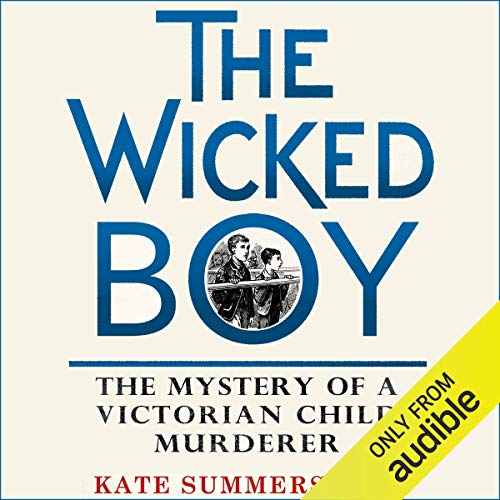This week, I’m going to be discussing Kate Summerscale’s The Wicked Boy – a shocking true story of a Victorian murder and the aftermath.
The Wicked Boy

The Author
Kate Summserscale became famous for writing The Suspicions of Mr Whicher, which won the Samuel Johnson Prize for Non-Fiction in 2008. You might be familiar with that book, which was made into a decent television drama, with the brilliant Paddy Considine as Jack Whicher, one of the original eight members of London’s newly formed Detective Branch (1842).
To a certain extent, Summerscale pulls off the same trick here, in The Wicked Boy, by uncovering and expertly dissecting another shocking Victorian murder.
The Murder
Early in the morning of Monday, 8 July 1895, 13-year-old Robert Coombes and his 12-year-old brother, Nattie, set out from their small, yellow-brick terraced house in East London to watch a cricket match at Lord’s. Their father had gone to sea the previous Friday and the boys told their neighbours that their mother was visiting her family in Liverpool. Over the next 10 days, Robert and Nattie spent extravagantly, pawning their parents’ valuables in order to fund trips to the theatre and to the seaside.
But as the sun beat down on the Coombes’ house, a strange smell began to emanate from the building. When the police were finally called to investigate, the discovery they made sent the press into a frenzy of horror and alarm, and Robert and Nattie were swept up in a criminal trial that echoed the outrageous plots of the penny dreadful novels that Robert loved to read.
Narration
Jot Davies is a prolific narrator on Audible (indeed, I’m currently listening to him narrate The Seven Deaths of Evelyn Hardcastle) and it’s really no surprise that he is in such demand, for he is a clear and engaging reader. No complaints on this front.
Parallels
There are interesting contemporary parallels – Robert’s beloved penny dreadfuls are the video nasties of the 80’s, or the new millennials’ violent computer games, and the press clearly have not evolved whatsoever in assigning blame to things that psychopaths are inevitably drawn to, rather than those by which they are corrupted.
Robert also shares a name with the one of the most notorious child killers of modern times and I kept being reminded of the murder of Jamie Bulger, when listening to the book, even if Summerscale does not mention the comparison herself. Whilst the two Roberts’ murders are quite different, it’s hard not to see how the justice system continues to suffer great difficulty in both comprehending and dealing with children who murder.
Conclusion
There are no easy answers presented in The Wicked Boy. We will probably never know why Robert killed his mother but the author’s detachment rather surprised me.
Summerscale was seemingly more interested in establishing whether Robert could reach a level of redemption in his subsequent life, rather than whether he was culpable. Pertinent questions, such as why a 13 year-old-boy would be sleeping in his mother’s bed, are left hanging and Summerscale largely falls in line with the defence team in exonerating Nattie of any responsibility, which rings a little false.
The depth of Summserscale’s research is, as ever, impressive but I think that one is still left reeling by the horror of it all, even if, undoubtedly, Robert went on to live a good, even heroic life, after his incarceration.

